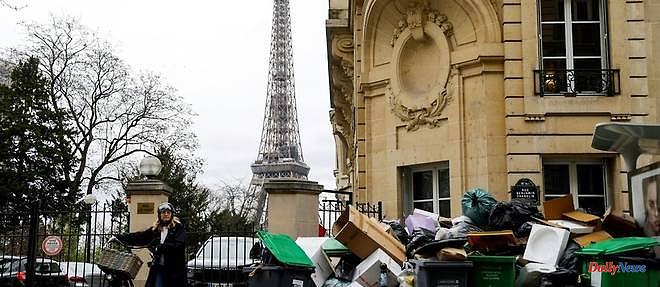Half private, half public, the historic system of waste collection in Paris is undermined by the strike against the pension reform, the districts managed by the agents of the town hall being more affected than the others.
For those who have been going up rue de Belleville (north-east) since the start of the renewable strike on March 6, the observation is striking: on the left side, that of the 19th arrondissement, the situation is under control, while the garbage is piling up on the floor on the right side, where the 20th arrondissement begins.
In the first, waste collection is provided by a private service provider, while city officials are responsible for the second.
A contrast that is repeated elsewhere in the capital. To the point that the mayor (Horizons) Delphine Bürkli of the 9th arrondissement, also under management and very affected by the movement, called for "solidarity between boroughs" to pool resources.
In normal times, it's a perfect balance: municipal services provide collection in half of the boroughs, while a handful of private operators share the other half.
A compromise that dates back to the time of Jacques Chirac, the first elected mayor of the capital in 1977, the year of a "giant CGT strike", remembers Philippe Goujon, one of his former assistants.
"He said: never again, and made this reform quite clever," summarizes the current mayor LR of the 15th arrondissement, interviewed by AFP.
"Paradox" of this "heritage", recognizes the elected LR David Alphand, "the right-wing districts are more oriented towards management", while those of the North-East of Paris, strongholds of the left, are in the hands of companies private.
Even if employees of private companies are also "on strike" against the pension reform, underlines the assistant (PS) for cleanliness Colombe Brossel, the debate is relaunched.
"This two-speed system has lasted too long", launches the mayor LR of the 17th arrondissement Geoffroy Boulard who requests "the privatization" of the service in his sector, petition in support.
"Nobody understands anything" about this "hybrid organization" now "completely inequitable", lambasted Delphine Bürkli in the Council of Paris, asking for a review.
“Total management”, replied the elected communist Nicolas Bonnet-Oulaldj before the socialist mayor Anne Hidalgo put an end to the suspense.
"I will not go back to this very intelligent model invented at the time by Jacques Chirac", declared the ex-PS presidential candidate, for whom this "flexible model" made it possible to "pool resources to respond to situations that could have a health impact in front of schools, nurseries..."
Will the 2026 municipal election campaign revive the debate?
Another Horizons elected official, Pierre-Yves Bournazel, in favor of delegating to the private sector, points out that the Regional Chamber of Accounts has, in 2011 and 2017, "advocated" privatization which would allow a "lower cost of collection per ton" and a "better level of performance" of the service.
And on the right, if the probable candidate Rachida Dati did not personally express herself in this sense, the mayors of her group demanded from 2021 "the outsourcing of this collection to private companies as well as to actors of the solidarity economy and sustainable" in order to "reassign nearly 700 agents to street cleaning".
By having a "Parisian proximity pact" adopted, Anne Hidalgo had then promised more means for the mayors of the arrondissements, in particular for cleanliness.
But Geoffroy Boulard's request to be able to use this envelope by resorting to private collection, from the start of the strike, remained a dead letter because the mayor "supports the social movement", he retains.
The threat of a switch to the private sector, Mohammed Touati, dump truck driver and CGT delegate, has "always heard that" for 20 years that he officiates.
The public-private balance, which "goes well in normal times", was chosen "so that at least half of Paris is picked up" in times of strike, sums up the striker, who considers it unrealistic to want to "recover all the boroughs" under management.
03/21/2023 18:53:14 - Paris (AFP) - © 2023 AFP












